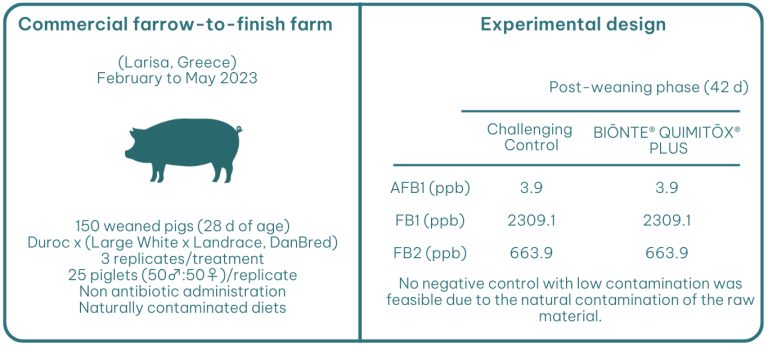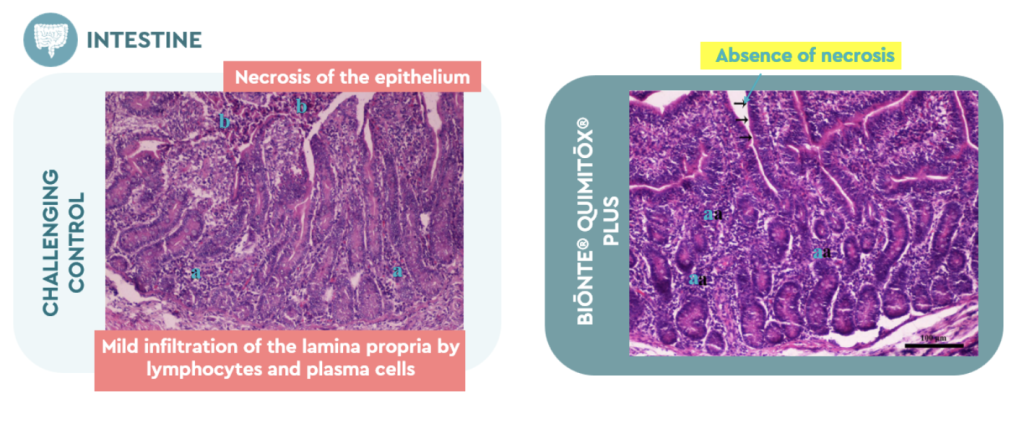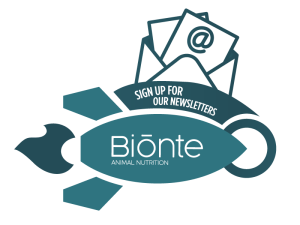Introduction
In pigs, the weaning period represents one of the most delicate phases of their production cycle. In fact, during this period there are several challenges that piglets must face in order to successfully overcome the changes in their digestive physiology and immune system.
Nowadays, the management processes on pig farms are highly specialized to successfully overcome this production stage. Thus, it is no coincidence that supplemented diets are highly specific for each production phase and are further adjusted according to their nutritional needs.
However, the success of this phase can be compromised by factors that are unfortunately beyond control and are not directly related to poor or good farm management. One of the most frequent examples is the contamination of raw materials and feed with mycotoxins.
Diets contaminated with mycotoxins, such as aflatoxin B1 and fumonisins, result in decreased production parameters and altered immune systems (Magnoli et al., 2019).
Therefore, one of the most effective solutions to reduce their effects is the inclusion of anti-mycotoxins products in the animals’ diet. There are numerous products on the market developed for this purpose. However, it is important to note that the mechanism of action is not the same.
BIŌNTE® QUIMITŌX® PLUS: in vivo trial in weaned piglets
At BIŌNTE we have developed BIŌNTE® QUIMITŌX® PLUS, an anti-mycotoxin solution, a product based on adsorbent materials, a unique combination of natural extracts and selected yeasts, which makes it an inimitable solution in animal nutrition.
In a previous trial conducted on weaned piglets by the University of Thessaly (Greece), we observed how BIŌNTE® QUIMITŌX® PLUS had counteracted the effect of mycotoxins and even improved production parameters. Therefore, we tested the efficacy of BIŌNTE® QUIMITŌX® PLUS on animal performance and antioxidant status in weaned pigs exposed to aflatoxin B1 and fumonisins (FB1+FB2)
Farm conditions
The efficacy of BIŌNTE® QUIMITŌX® PLUS was tested on 150 piglets, 28 days old, receiving two treatments:
Control: naturally contaminated diet with 3.9 ppb aflatoxin B1 (AFB1); 2309.1 fumonisin B1 (FB1) and 663.9 ppb of fumonisin b2 (FB2);
Experimental: naturally contaminated diet supplemented with 2.5 kg/t BIŌNTE® QUIMITŌX® PLUS (Figure 1).
The control diet had polycontamination by mycotoxins, which can lead to synergistic negative effects and therefore decrease growth and increase mortality in this species.
Feed intake, body weight (BW), average daily gain (ADG) and mortality were controlled daily throughout the entire process. Plasma samples were also collected for analysis of antioxidant function, including thiobarbituric acid reactive substances (TBARS), protein carbonyls (CARBs) and total antioxidant capacity (TAC). On the last day of the experiment, intestinal tissue samples were collected for histopathological evaluation.

Figure 1. Experimental conditions
BIŌNTE® QUIMITŌX® PLUS: a true support in improving production parameters, as well as alleviating oxidative stress
As shown in Figure 2, BIŌNTE® QUIMITŌX® PLUS improved once again the productive parameters, being an improvement of 16.6% in BW and 12.5% in ADG, after 42 d of weaning. In addition, mortality was reduced by 60%, indicating the beneficial effect of BIŌNTE® QUIMITŌX® PLUS in optimizing this critical productive phase.

Figure 2. Productive parameters in weaned piglets fed with or without BIŌNTE® QUIMITŌX® PLUS
According to the results observed in Figure 3, BIŌNTE® QUIMITŌX® PLUS alleviated oxidative stress by reducing biomarkers TBARS and CARBs by 26.1% and 10.1%, respectively, as well as extending total antioxidant function (TAC) by 3.8%.

Figure 3. Biomarkers of oxidative stress in weaned piglets fed with or without BIŌNTE® QUIMITŌX®
Biomarkers of oxidative stress in weaned piglets fed with or without BIŌNTE® QUIMITŌX® PLUS®
One of the most affected organs in animals consuming mycotoxin contaminated diets is the intestine. In Figure 4, the picture on the left reflects the lesions found in piglets that did not receive any anti-mycotoxin product in their diet: mild infiltration of the lamina propria by lymphocytes and plasma cells, as well as necrosis of the epithelium. However, piglets receiving BIŌNTE® QUIMITŌX® PLUS, photo on the right, showed absence of necrosis of the intestinal epithelium, which confirms once again the ability of the product to mitigate the harmful effects on the animals.

Figure 4. Intestinal histopathological examination in weaned piglets fed with or without BIŌNTE® QUIMITŌX® PLUS
Conclusion
This study confirms once again the capacity of BIŌNTE® QUIMITŌX® PLUS to mitigate the effects of mycotoxins, as well as to improve productive parameters and alleviate oxidative stress in weaned piglets.



